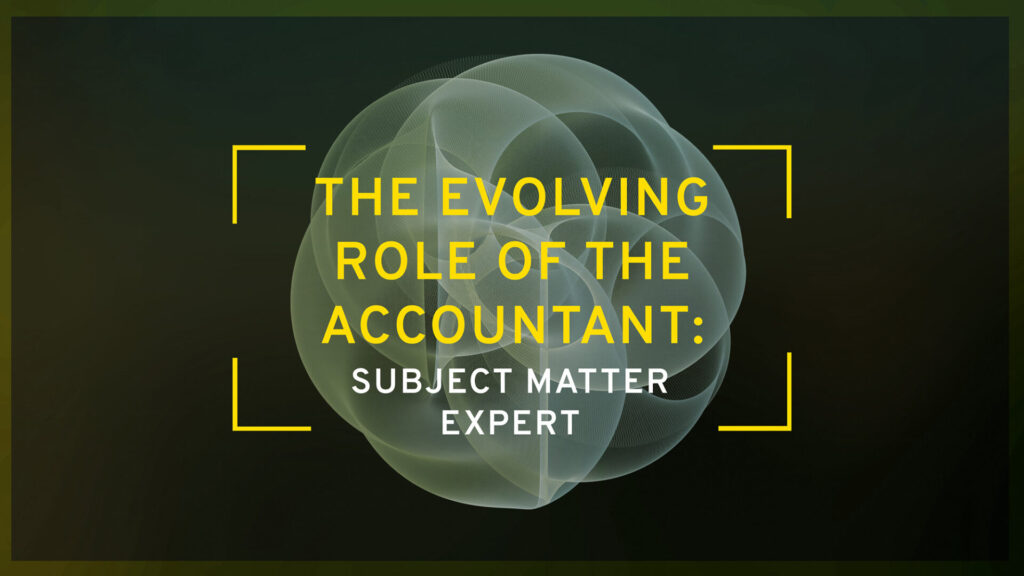We previously explored the roles of the first two verticals of accounting: the Finance Technologist (see here>>>) and Strategic Business Partner (see here>>>). The final vertical is Subject Matter Expert.
What is it?
Subject Matter Experts (SMEs) are specialists with deep expertise in niche areas within finance. These roles are primarily found within the control, regulatory, and compliance environment, requiring advanced knowledge and skills in specific domains. As businesses face evolving regulations and increasing complexity, demand for SMEs continues to rise. Below, we explore some key areas where we are seeing significant growth.
Why is it important?
SMEs play a crucial role in ensuring organisations remain compliant, mitigate risks, and implement best practices. Whether focusing on ESG reporting, risk management, or internal controls, these professionals provide the necessary expertise to navigate an increasingly complex financial and regulatory landscape.
What do they do?
Environmental, Social & Governance (ESG)
One rapidly growing specialisation is ESG. With the Corporate Sustainability Reporting Directive (CSRD) requirements coming into effect, there is an increasing need for finance professionals to lead ESG-related initiatives. Many organisations are forming dedicated ESG teams to prepare for mandatory reporting in 2026, creating significant opportunities for accountants to transition into this space.
Roles in ESG can cover a range of responsibilities, including:
- ESG readiness, implementation & delivery
- ESG accounting and reporting
- Advisory roles focusing on sustainability strategies and compliance
For professionals looking to upskill in this area, specialist diplomas in sustainability are available. Chartered Accountants, for example, offer two diplomas focusing on ESG strategy, risk, reporting, and assurance.
Business Controls & Risk Management
Another key area of demand is Business Controls & Risk Management. Roles within this domain span internal controls, internal audit, and Governance, Risk, and Compliance (GRC) positions. This broad category is seeing increased hiring activity due to several factors:
- SOX Compliance for US Listings
Irish entities transitioning to US stock exchange listings must comply with the Sarbanes-Oxley Act (SOX). As a result, organisations are strengthening their Business and IT Controls teams through SOX transformation and readiness programs and maintaining dedicated SOX compliance teams. - Digital Transformation & Cybersecurity
As companies implement new technologies and digital transformation initiatives, they must also address associated risks, such as cybersecurity threats, data integrity concerns, and system controls. SMEs in this space help ensure that technology adoption enhances efficiency while maintaining financial security and operational resilience. - Shared Services & Global Business Services (GBS) Hubs
Many companies are consolidating back-office functions into shared service centres or global business services (GBS) hubs. To ensure consistency and reduce risk across multiple geographies, these hubs require strong internal controls and governance frameworks, increasing the demand for risk management professionals.
The growing need for Subject Matter Experts highlights the evolving landscape of finance, where deep specialisation is becoming a key driver of value. As regulatory frameworks tighten and technology continues to reshape the industry, finance professionals with niche expertise will play an increasingly critical role in shaping the future of finance.
Final Thoughts
As the accounting profession continues to evolve, the role of accountants is shifting beyond traditional functions into highly specialised and technology-driven domains. Whether you operate in the Strategic Business Partner, Finance Technologist or Subject Matter Expert vertical, accounting professionals are expected to drive value, enable transformation, and navigate increasing complexity.
The key takeaway? The future of accounting isn’t just about adapting to change; it’s about proactively shaping it. By continuously upskilling, embracing technology, and developing strategic expertise, today’s accountants can position themselves at the forefront of this transformation, creating new opportunities for themselves and the businesses they support.
Catherine Drysdale, FCA & member of Technology Committee, Chartered Accountants Ireland


 Jump Back
Jump Back

